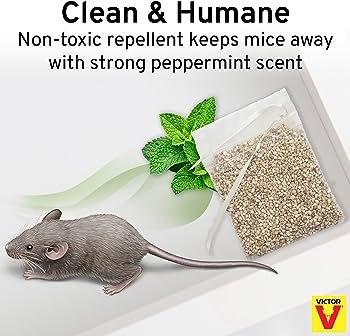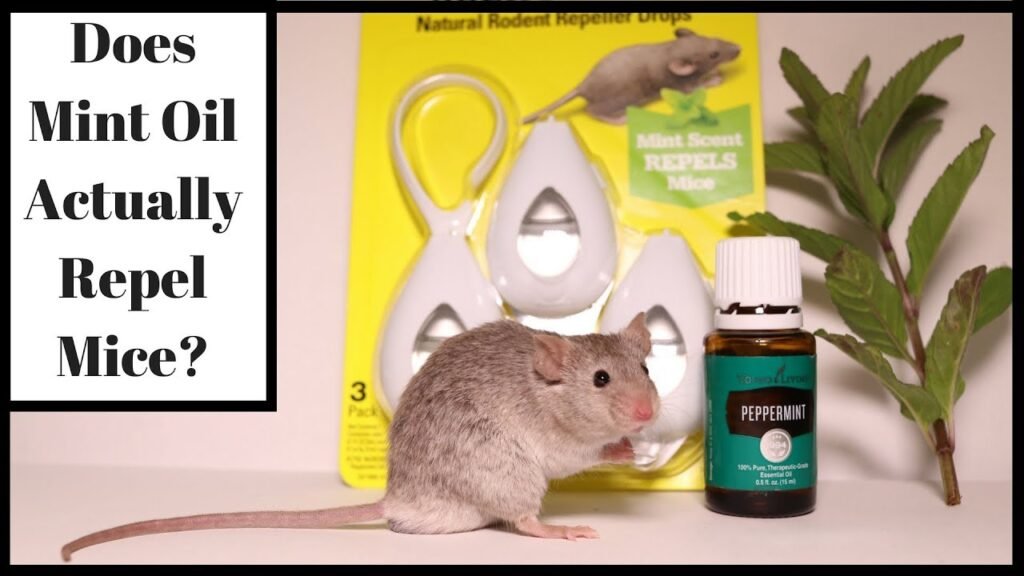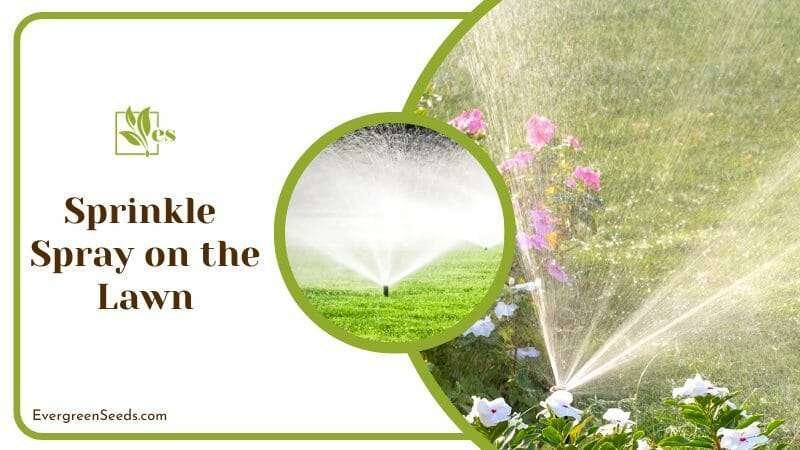Looking for the most effective way to keep those pesky rodents away from your home? Look no further! In this article, we will explore various rodent repellent options and help you determine which one is the best for your needs. From natural methods to electronic devices, we’ve got you covered. Say goodbye to unwanted critters invading your space and hello to a rodent-free environment. Let’s get started!


Natural Rodent Repellents
Peppermint Oil
Peppermint oil is a natural and effective way to repel rodents. Its strong scent is highly disliked by rodents, which makes it an excellent deterrent. To use peppermint oil as a repellent, simply soak cotton balls in the oil and place them in areas where you suspect rodent activity. Refresh the cotton balls every few days to ensure the scent remains strong.
Ammonia
Ammonia is another natural repellent that can be used to deter rodents. It has a strong odor that can be overwhelming for rodents, driving them away from your home. To use ammonia as a repellent, mix it with water in a spray bottle and spray it in areas where you have seen rodent activity. Be cautious when using ammonia, as it can be harmful if ingested or inhaled by humans or pets.
Garlic
Garlic is not only a versatile ingredient in the kitchen but also an effective rodent repellent. Its pungent smell is disliked by rodents, making it a great natural deterrent. To use garlic as a repellent, crush a few cloves and place them in areas of rodent activity. You can also create a garlic spray by blending garlic cloves with water and spraying it around the perimeter of your home.
Onion
Similar to garlic, the strong odor of onions can repel rodents effectively. Simply cut an onion into slices or quarters and place them in areas where you have noticed rodent activity. Replace the onions every few days to ensure the odor remains strong. Keep in mind that onions can cause eye irritation, so handle them with care.
Electronic Rodent Repellents
Ultrasonic Devices
Ultrasonic devices emit high-frequency sound waves that are unpleasant for rodents, but are generally inaudible to humans. These devices can be plugged into an electrical outlet and cover a certain range of area. They are an easy and convenient way to repel rodents without the need for harmful chemicals or traps.
Electromagnetic Devices
Electromagnetic devices work by altering the electromagnetic field within your home, which disrupts the navigational abilities of rodents. This can make your home appear undesirable and cause rodents to seek shelter elsewhere. Similar to ultrasonic devices, electromagnetic devices are easy to use and require minimal maintenance.
Ionic Devices
Ionic devices release negatively charged ions into the air, which can repel rodents. These ions attach to airborne particles, reducing the quality of the air and making it less appealing for rodents. Ionic devices are safe to use and do not require any chemicals or traps.


Chemical Rodent Repellents
Mothballs
Mothballs are a commonly used chemical repellent for rodents. They contain a substance called naphthalene, which emits a strong odor that repels rodents. However, it is important to note that mothballs can be toxic to humans and pets if ingested or inhaled in large amounts, so they should be used with caution.
Rodenticides
Rodenticides are chemicals specifically designed to kill rodents. They come in various forms such as pellets, baits, and powders, and are typically mixed with ingredients that are attractive to rodents. While rodenticides can effectively eliminate rodent infestations, they should only be used as a last resort and with caution. It is important to follow the instructions carefully and keep them out of reach of children and pets.
Physical Rodent Repellents
Traps
Traps are a tried-and-true method of physically capturing rodents. There are different kinds of traps available, including snap traps, live traps, and glue traps. Snap traps are designed to kill rodents instantly, while live traps allow you to capture and release them elsewhere. Glue traps are adhesive surfaces that rodents get stuck to. Choose the type of trap that aligns with your values and preferences.
Barriers
Barriers are physical deterrents that prevent rodents from entering certain areas. This can include sealing gaps in walls and floors, installing door sweeps, and using wire mesh to cover openings. By creating barriers, you can effectively block rodents from entering your home and reduce the risk of infestations.


Best Rodent Repellent Plants
Lavender
Not only does lavender add a lovely fragrance to your garden, but it also repels rodents. The strong scent of lavender is disliked by rodents, making it an effective natural deterrent. Plant lavender bushes near entrances and windows to keep rodents away from your home.
Marigold
Marigolds are not only bright and beautiful flowers but also effective rodent repellents. The strong smell of marigolds deters rodents, making them a great addition to your garden. Plant marigolds around your garden and near potential entry points to discourage rodents from entering.
Mint
Mint is well-known for its refreshing scent, but it also serves as a potent rodent repellent. Plant mint in your garden or place potted mint plants near doors and windows to deter rodents. Additionally, mint leaves can be dried and used as a natural repellent indoors.
Daffodils
Daffodils not only add a splash of color to your garden but also repel rodents. The alkaloids present in daffodils are disliked by rodents, making them an effective natural deterrent. Plant daffodils around the perimeter of your garden or near potential entry points to keep rodents away.
Rodent-Proofing Your Home
Sealing Entry Points
One of the most crucial steps in rodent-proofing your home is to seal any potential entry points. Inspect your home for gaps in walls, floors, and foundations, and seal them using caulk, steel wool, or wire mesh. Pay close attention to areas around pipes and utility entrances, as rodents can squeeze through even the smallest openings.
Keeping Food Secure
Rodents are attracted to sources of food, so it’s important to keep your food secure. Store all food items in airtight containers and clean up any spills or crumbs immediately. Make sure to secure trash cans with tight-fitting lids and avoid leaving pet food out overnight.
Maintaining Cleanliness
Maintaining cleanliness is key to preventing rodent infestations. Regularly clean your home, especially areas where food is prepared or consumed. Sweep floors, wipe countertops, and vacuum carpets regularly to remove any food debris that may attract rodents. By keeping your home clean, you make it less appealing for rodents to enter and establish their presence.


Effectiveness of Different Repellents
Individual Preferences
The effectiveness of rodent repellents can vary depending on individual preferences. Some people may find certain natural repellents more effective, while others may prefer electronic or chemical options. It’s important to experiment with different methods and find what works best for you and your home.
Environmental Factors
Environmental factors, such as climate and surroundings, can also influence the effectiveness of repellents. For example, outdoor repellent plants may be more effective in a garden setting than in an urban environment. Consider the specific conditions of your surroundings when choosing a repellent method.
Rodent Species
Different rodent species may have varying sensitivities to repellents. Some species may be more deterred by certain smells or sounds than others. Research the common rodent species in your area and tailor your repellent methods accordingly.
Infestation Severity
The severity of a rodent infestation can also impact the effectiveness of repellents. Mild infestations may be effectively controlled with natural or electronic repellents, while more severe infestations may require the use of chemical treatments or professional pest control services.
Safety Considerations
Potential Hazards
When using any repellent method, it is important to consider the potential hazards. Chemical repellents, such as rodenticides or mothballs, can be toxic if ingested or inhaled in large amounts. Ultrasonic devices and electromagnetic devices may not be safe for use around individuals with certain medical conditions, such as epilepsy. Always read and follow the instructions provided with the repellent method and take necessary safety precautions.
Pets and Children
When choosing a repellent method, consider the safety of your pets and children. Some repellents, such as chemical rodenticides, can be harmful or even fatal if ingested by pets or young children. Keep all repellents out of reach and, if necessary, choose methods that pose minimal risk to your loved ones.
Indoor vs. Outdoor Use
Certain repellent methods may be better suited for indoor or outdoor use. For example, electronic devices are generally designed for indoor use, while outdoor repellent plants may not thrive indoors. Consider the specific needs of your home and choose repellent methods accordingly.


Cost and Convenience
Budget-Friendly Options
Rodent repellents come in a range of prices, so it’s important to consider your budget. Natural repellents, such as peppermint oil or garlic, are often more budget-friendly options compared to electronic or chemical methods. Additionally, trapping and physical barriers may require some upfront investment but can provide long-term cost savings.
Long-Term vs. Short-Term Effects
When choosing a repellent method, consider whether you are looking for a long-term or short-term solution. Electronic and chemical methods, such as ultrasonic devices or rodenticides, may provide quicker results but may require ongoing maintenance or reapplication. Natural and physical repellents, on the other hand, may require more time and effort but can offer long-term effectiveness.
Ease of Use
Consider the ease of use when selecting a repellent method. Some methods, such as electronic devices or natural repellent plants, require minimal effort to set up and maintain. Others, like traps or physical barriers, may require more involvement. Choose a method that aligns with your lifestyle and capabilities.
Combining Repellent Methods
Enhanced Effectiveness
Combining different repellent methods can often lead to enhanced effectiveness. For example, using natural repellent plants alongside electronic devices can create multiple deterrents for rodents. By using multiple approaches, you increase the chances of repelling rodents and preventing infestations.
Multiple Approaches
Different repellent methods target rodents in different ways, so using multiple approaches can cover a wider range of deterrents. For example, natural repellents can target the rodents’ sense of smell, while electronic devices can target their hearing. By using a combination of methods, you create a comprehensive and multi-faceted approach to repelling rodents.
In conclusion, there are various types of rodent repellents available, each with its own pros and cons. Natural repellents, such as peppermint oil and garlic, offer a safe and environmentally-friendly option. Electronic devices, like ultrasonic and electromagnetic devices, provide convenient and easy-to-use alternatives. Chemical repellents, like mothballs and rodenticides, should be used with caution and only as a last resort. Physical repellents, such as traps and barriers, can effectively capture or deter rodents. Additionally, repellent plants like lavender and marigold can be a garden-friendly way to keep rodents at bay. When choosing a repellent method, consider factors such as individual preferences, environmental factors, rodent species, and the severity of the infestation. Always prioritize safety considerations when using repellents, especially around pets and children. Consider the cost, convenience, and ease of use when selecting a method. Lastly, combining multiple repellent methods can often lead to enhanced effectiveness. By utilizing a variety of approaches, you can increase the likelihood of successfully repelling rodents and keeping your home rodent-free.
Your Expert in Animal Control and Extermination. Trust our experience for humane, effective pest management, protecting your property and ensuring peace of mind with Michael S.





